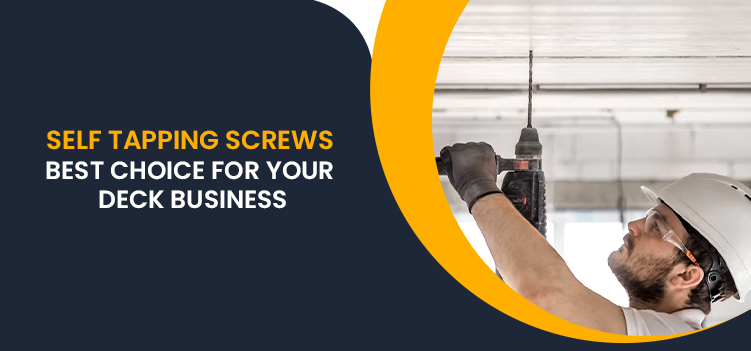Self-tapping screws are the ideal fastener when it comes to cutting threads in materials such as metal, plastic, and wood without any pre-drilling. It comes in various sizes and shapes and is commonly used in construction, metalworking, or electronic industries. Go through the article to know more about self-tapping screws for deck business.
What Are the Benefits of Self-Tapping Screws in Your Deck Business?
Self-tapping screws can be very advantageous in the deck industry for multiple reasons:
Simple installation: Self-tapping screws don’t require predrilling holes because of their pointed end, making it simple to drill into the material. Compared to other types of screws, they are easier to install.
Self-tapping screws provide better-holding power than other kinds of screws. This is because they establish a more secure connection by creating threads as they are driven into the material.
Reduced splitting: When working with softer woods, self-tapping screws are especially crucial as they lessen the possibility of the material separating.
Rust resistance: Self-tapping screws are suitable for all outdoor applications like building decks, as they are frequently made of stainless steel or other rust-resistant materials.
Self-tapping screws are versatile and can be used in various materials, including plastic, metal, and wood. Therefore, they are a flexible option for deck builders who work with various kinds of materials.
Self-tapping screws are a useful tool for deck builders since they may speed up, strengthen, and reliably complete deck construction projects.
Sizes of Self-Tapping Screw
Self-tapping screws are available in wide ranges of sizes, designated by the number representing the diameter of the screws.
The length of the self-tapping screws will depend upon the thickness of the materials used for the screw. Choosing the appropriate length and size of the screw is crucial to ensure a safe and secure connection.
Self-tapping screws come in various styles, such as flat head, countersunk, and pan head. The style of the screw will depend upon the specific application as well as the preference of the builder.
Materials of Self-Tapping Screw
Self-tapping screws can be made up of various materials, and each comes up with its benefits and limitations. The most common materials used for the self-tapping screws include:
Stainless steel: Due to its strength, sturdiness, and resistance to rust, stainless steel is a preferred material for self-tapping screws. This makes it perfect for outdoor applications like deck construction.
Another material frequently utilized to make self-tapping screws is carbon steel. Although durable and inexpensive, it is not as corrosion-resistant as stainless steel.
Self-tapping ornamental screws are frequently made of corrosion-resistant brass material. Inconel might not be appropriate for heavy-duty applications because it is less robust than steel.
Zinc-plated steel provides corrosion and rust resistance for self-tapping screws made of steel. They are an affordable substitute for stainless steel screws.
Self-tapping screws made of aluminum are lightweight and resistant to corrosion, making them a popular option for outdoor applications. However, they might not be appropriate for heavy-duty applications because they are not as strong as steel screws.
The choice of material depends on the specific application and the builder’s preferences for strength, durability, and cost.
Tips For Self-Tapping Screw Installation
The following advice will help you install self-tapping screws:
Make sure to select the appropriate size and length of self-tapping screw for the task. A weak connection or material damage might arise from using a screw that is either too short or too long.
Choose the proper tool: Self-tapping screws require a power drill and a screwdriver bit that are suitable in order to prevent stripping or damage to the screw; use the proper bit size.
Predrill for harder materials: While self-tapping screws are made to drill their own holes, installation may be facilitated by a predrilled pilot hole for tougher materials like metals or hardwoods.
Utilize rust-resistant screws for outdoor projects: To ensure long-lasting performance, use rust-resistant screws made of materials like stainless steel, brass, or zinc-plated steel when working on decks or other outside projects.
Self-tapping screws should not be used close to the material’s edges: When put too close to the edge of the material, self-tapping screws may cause splitting or cracking. Using a different kind of fastener, such as a wood screw, is better.
These recommendations will help you install self-tapping screws securely and correctly for a connection that will last for a long time.
Conclusion
Sohan Lal Gupta is one of the pioneers in the industry of fasteners. We cover a wide scope of items in metric shapes. Our main objective is to provide quality items to the customers. We ensure that our crew uses high-grade raw materials for manufacturing the final product. Contact us today to get to buy our products.

